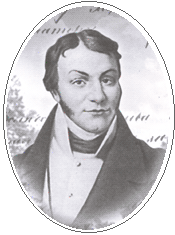Hryhory Kvitka

Hryhory Kvitka or Osnovyanenko (1778–1843) was a Ukrainian writer, journalist, and playwright. He was born in the vicinity of Kharkiv.
Life and work
Hryhory Kvitka was born in 1778 in the village of Osnova, near the city of Kharkiv, to a family of Ukrainian nobility.[1] He adopted the pen name "Osnovyanenko," a reference to the village of his birth, when he embarked on his literary career.[2]
Kvitka was one of the earliest proponents of Ukrainian as a literary language and began publishing in the first Ukrainian literary journals printed in Kharkiv in the early 19th century.[3] Like most of his contemporaries in the Ukrainian literary scene, he also wrote in Russian.[4] He was a friend of Nikolai Gogol, and it is possible that Gogol's play The Government Inspector was inspired by Kvitka's satiric drama The Visitor from the Capitol or Turmoil in a District Town, which has a very similar plot and cast of characters.[5]
His Ukrainian-language works were mostly burlesque and satirical in nature, but he also wrote more serious prose, such as his sentimental novella Marusia.[4] He also tried his hand at the gothic genre with his "Dead Man’s Easter"[6] (1834). According to his own statement about the work, he wrote it "to prove to one unbeliever that something gentle and moving can be written in the Ukrainian language."[7]
Critical reception
Kvitka's literary achievement has tended to be a polarizing subject for critics of Ukrainian culture. On the one hand, as one of the first popular writers to use the Ukrainian language, he is viewed a founding figure of Ukrainian literature. On the other hand, many prominent Ukrainian scholars, including Ivan Franko, Mykola Zerov, and Dmytro Chyzhevsky, viewed his work as reactionary and conservative and were skeptical of the sentimental, pastoral image that he painted of Ukraine and Ukrainians.[3]
References
- ↑ Smoliĭ V. A.; Onoprii︠e︡nko Oksana (2001). Golden book of Ukrainian elite. Kompanii︠a︡ "I︠E︡vroimidz︠h︡". ISBN 978-966-7867-11-9. Retrieved 15 April 2012.
- ↑ Encyclopaedia Britannica. Encyclopaedia Britannica. 1973. ISBN 978-0-85229-173-3. Retrieved 15 April 2012.
- 1 2 Shkandrij Myroslav (9 October 2001). Russia and Ukraine: Literature and the Discourse of Empire from Napoleonic to Postcolonial Times. McGill-Queen's Press - MQUP. p. 126. ISBN 978-0-7735-2234-3. Retrieved 15 April 2012.
- 1 2 Terras Victor (25 July 1990). Handbook of Russian Literature. Yale University Press. p. 241. ISBN 978-0-300-04868-1. Retrieved 15 April 2012.
- ↑ Peace Richard (30 April 2009). The Enigma of Gogol: An Examination of the Writings of N. V. Gogol and Their Place in the Russian Literary Tradition. Cambridge University Press. pp. 151–152. ISBN 978-0-521-11023-5. Retrieved 15 April 2012.
- ↑ Krys Svitlana, Between Comedy and Horror: The Gothic in Hryhorii Kvitka-Osnovianenko’s Dead Man’s Easter (1834). Slavic and East European Journal (SEEJ) 55.3 (Fall 2011): 341-358
- ↑ Potichnyj Peter J. (1992). Ukraine and Russia in Their Historical Encounter. CIUS Press. p. 242. ISBN 978-0-920862-84-1. Retrieved 15 April 2012.